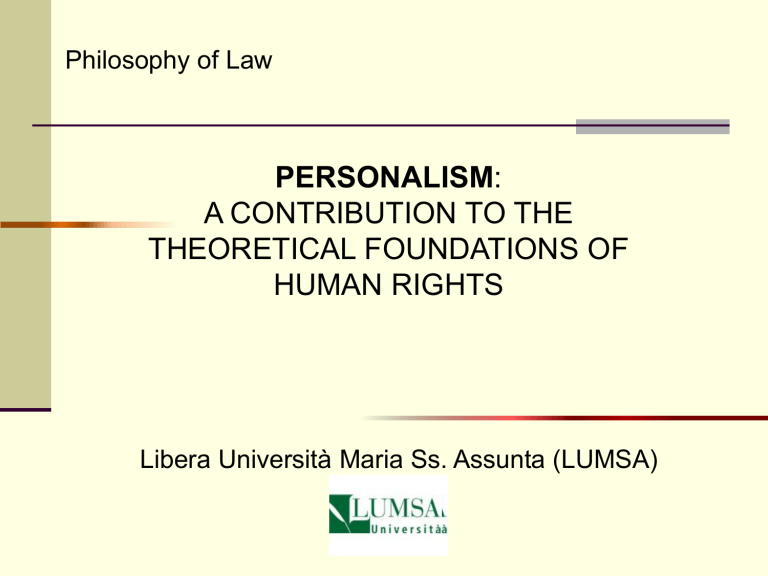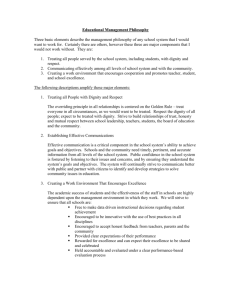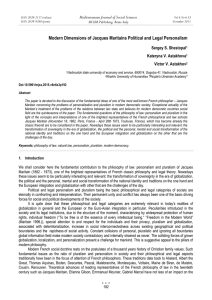Personalism

Philosophy of Law
PERSONALISM :
A CONTRIBUTION TO THE
THEORETICAL FOUNDATIONS OF
HUMAN RIGHTS
Libera Università Maria Ss. Assunta (LUMSA)
Philosophy of Law
Personalism
Although it was only in the first half of the twentieth century that the term personalism became known as a designation of philosophical schools and systems, personalist thought had developed throughout the nineteenth century as a reaction to perceived depersonalizing elements in Enlightenment rationalism, pantheism, individualism as well as collectivism in politics, and materialist, psychological, and evolutionary determinism.
Personalism always underscores the centrality of the person as the primary locus of investigation for philosophical, theological, and humanistic studies.
It is an approach or system of thought which regards or tends to regard the person as the ultimate explanatory, epistemological, ontological, and axiological principle of all reality.
Philosophy of Law
What is personalism ?
The general affirmation of the centrality of the person for philosophical thought.
Personalism posits ultimate reality and value in personhood.
It emphasizes the significance, uniqueness and inviolability of the person, as well as the person's essentially relational or communitarian dimension.
Personalists believe that the human person should be the ontological and epistemological starting point of philosophical reflection.
They are concerned to investigate the experience , the status , and the dignity of the human being as person , and regard this as the starting-point for all subsequent philosophical analysis.
They regard personhood (or “personality”) as the fundamental notion, as that which gives meaning to all of reality and constitutes its supreme value.
Personhood carries with it an inviolable dignity that merits unconditional respect.
Philosophy of Law
Thomistic personalism :
the best known strain of personalism in the broad sense is socalled “Thomistic personalism.”
Represented by such figures as Jacques Maritain,
Yves Simon, Étienne Gilson, and Karol Wojtyła.
Thomistic personalism draws on principles of Thomas
Aquinas's philosophical and theological anthropology in what it sees as a coherent development of Aquinas's thought.
Philosophy of Law
Historical background:
Personalism is the apex of a pyramid whose base was laid by Aristotle .
The term person comes from the Latin persona , whose origins are traceable to Greek drama, where it became identified with the role an actor would assume in a given production.
According to Étienne Gilson , Thomas Aquinas saw the individual person as unique among beings because of reason and self-mastery. Though none goes so far as to call Aquinas a personalist, some suggest that he provided the necessary soil in which personalistic theory could take root.
In this regard, Karol Wojtyła wrote that Aquinas “provided at least a point of departure for personalism in general.”
Philosophy of Law
Its introduction into the mainstream of intellectual reflection , however, came with theological discourse , notably the attempts to clarify or define central truths of the Christian faith.
These discussions focused primarily on two doctrines: the Trinity (three “persons” in one God) the incarnation of the second person of the Trinity (the “hypostatic” union of two natures —divine and human—in one “person”).
Though the concept of person first developed in this theological context, with reference to the persons of the Trinity , the general
Greek philosophical concepts involved in these Trinitological origins facilitated its application to human beings as well.
Philosophy of Law
The classic , basic, and purely philosophical definition “ naturae rationalis ” qualifies the notion of individual substance:
the person is an individual possessing a rational nature .
It is this rational, spiritual nature that gives rise to the different qualities that distinguish the person, qualities to which personalists attach decisive importance ( Aristotle ).
The early modern concepts of subjectivity and self-consciousness added new elements to the definition and understanding of the central concept in personalism:
Kant contributed significantly to the personalist understanding of human dignity .
Unlike Hobbes , for whom “the worth of a man” is
“his price,” and dignity is “the publique worth of a man,” Kant regarded dignity as “intrinsic worth”.
He posited a dichotomy between price and dignity , whereby “something that has a price can be exchanged for something else of equal value; whereas that which exceeds all price and therefore admits of no equivalent, has a dignity.”
His celebrated practical categorical imperative — Act so as to treat humanity, whether in your own person or in that of another, always as an end and never as a means only —was incorporated into Karol
Wojtyła 's “personalist principle.”
Philosophy of Law
Karol Wojtyła characterized the two extremes of individualism and collectivism in the following way:
“On the one hand, persons may easily place their own individual good above the common good of the collectivity, attempting to subordinate the collectivity to themselves and use it for their individual good.
This is the error of individualism, which gave rise to liberalism in modern history and to capitalism in economics.
On the other hand, society, in aiming at the alleged good of the whole, may attempt to subordinate persons to itself in such a way that the true good of persons is excluded and they themselves fall prey to the collectivity. This is the error of totalitarianism, which in modern times has borne the worst possible fruit.”
Philosophy of Law
J. Maritain wrote of personalism as “ a phenomenon of reaction ” against the “two opposite errors” of totalitarianism and individualism, stressing both:
the inviolable dignity of the individual person
his social nature and essential relationality.
He played a role in drafting the 1948 United Nations Universal
Declaration of Human Rights.
J. Maritain (Paris, 1882-1973)
One of the leading thinkers of the Catholic natural law tradition of the twentieth century:
He undertook an intensive study of the writings of
Thomas Aquinas.
In his early work, M. sought to defend Catholic thought against dominant secular worldviews.
By the 1930s, he began to elaborate the principles of a liberal Christian humanism/defense of human rights
M. legal and political philosophy lies within the aristotelic-thomistic tradition .
Following Aquinas, he distinguishes four types of law:
1) eternal
2) natural
3) “common law of civilization” ( droit des gens or jus gentium )
4) positive ( droit positif )
His focus is however on natural law
For M., natural law is not a written law:
It is immanent in nature
He argued that it is in terms of the specific end of a thing (the
“ normality of its functioning ”) that one knows what it “should” do or how it “should” be used.
Thus, natural law is:
“an order/disposition that the human reason may discover and, according to which, the human will must act to accord itself with the necessary ends of the human being ”
It “prescribes our most fundamental duties”
“coextensive” with morality
Maritain’s distinctive contribution to natural law theory:
He emphasizes that the first principles of natural law (“ we must do good and avoid evil ”) cannot be proven scientifically
They are known preconsciously (“through that which is consonant with the essential inclinations of human nature”)
According to Maritain:
Natural law is “ universal / invariable ”
BUT:
He holds that it is not founded on human nature
It is rooted in divine reason (the eternal law)
It is “written into” human nature by God
Natural law is law only because it is participation in
Eternal Law
The “ droit des gens ” is:
Intermediate between the natural and positive law
It is concerned with human beings as social beings( for example, as citizens/member of families)
It is inherent in all organized social life
The “ Positive law ” is concerned with the rights and duties that:
exist contingently in a particular community dependent on the stage of social/economic development and on the specific activities of individuals within it
These kinds of law do not constitute part of the natural law (though they are rationally derivable from the first principle)
It is in virtue of their relation to natural law that they
“have the force of law/impose themselves on conscience”
Maritain’s objections to legal positivism
M. rejects legal positivism because:
It provides an arbitrary standard of law based only on the command of the ruler
It fails to explain one’s obligation to obey law
Therefore:
When a positive law acts against the moral order, it is
(strictly speaking) not a law
Maritain’s defense of natural rights reflects his analysis of natural law:
Since each “ person ” has a duty to realize his/her nature, it is necessary to have the means to do so, that is, the rights which, since they are related to that nature, are called “ natural ”.
This reflects the aristotelian principle of justice (e.g. that we should distribute to each “what is truly his or hers”).
Maritain’s distinction between the
“
person
” and the “
individual
”
Human beings have a “ material” side” and, as part of civil society, are “ individuals ”, who have obligations to a common, social good.
However:
They also have a “ spiritual ” side – they are
“ persons ”
The person is a “whole”, it has a “ transcendent ” destiny. It is an object of dignity , and “must be treated as an end”
Natural rights are “fundamental and inelianable”, antecedent in nature/superior to society
Philosophy of Law
Characteristics of personalist thought :
Though personalism comprises many different forms and emphases, certain distinctive characteristics can be discerned that generally hold for personalism as such.
These include:
an affirmation of the dignity of persons
a concern for the person's subjectivity and selfdetermination
particular emphasis on the social (relational) nature of the person.
Philosophy of Law
The dignity of the person :
At the center of this personalism stands an affirmation of the dignity of the person, the quality, insisted on already by medieval thinkers, which constitutes the unique excellence of personhood and which gives rise to specific moral requirements .
Dignity refers to the inherent value of the person , as a “ someone ” and not merely “ something ,” and this confers a peculiarity not found in other beings.
Philosophy of Law
Every person without exception is of inestimable worth , and no one is dispensable or interchangeable.
The person can never be lost or assimilated fully into the collectivity, because his interrelatedness with other persons is defined by his possession of a unique, irreplaceable value.
For personalists, human dignity as such does not depend on variables such as:
native intelligence athletic ability or social prowess
It must rather be rooted in human nature itself, so that on the deepest level, despite the variations of moral conduct and the resultant differences in moral character, all members of the species share this dignity.
Philosophy of Law
Interiority and subjectivity:
In the modern sense, subjectivity depends primarily on the unity of self-consciousness, and on interiority, freedom, and personal autonomy.
Personal subjectivity embraces the moral and religious dimensions, which are part of the person's nature as a conscious, intelligent, free, willing subject in relation with God and others.
As free, thinking subjects , persons also exercise creativity through their thought, imagination, and action, a creativity which affects both the surrounding world and the person himself.
Philosophy of Law
The focus on the subjectivity of persons explains personalists' insistence on the difference between the concept of “ person ” and that of “ individual ”.
The major distinction is that an individual represents a single unit in a homogenous set, interchangeable with any other member of the set, whereas a person is characterized by his uniqueness and irreplaceability .
Von Balthasar states: “If one distinguishes between individual and person then a special dignity is ascribed to the person, which the individual as such does not possess…We will speak of a
‘person’…when considering the uniqueness, the incomparability and therefore irreplaceability of the individual.”
Philosophy of Law
Self-determination :
Self-mastery and freedom characterize personal beings.
The person not only directs himself toward a value, he determines himself as well.
The person is not only responsible for his actions, he is also responsible for himself, for his moral character and identity: By free moral action the personal subject becomes good or bad as a human being.
Philosophy of Law
Relationality and communion :
Personalists stress the person's nature as a social being .
According to personalists, the person never exists in isolation, and moreover persons find their human perfection only in communion with other persons.
Interpersonal relations are constitutive of his inherent make-up and vocation.
Relation is proper only to the person. Personalism has endeavored to highlight this aspect of personhood and bring it to the fore.
Philosophy of Law
Personalists recognize that as much as he may strive for independence, the human person necessarily relies on others .
He depends on other persons for his survival and development, and this interdependence is a hallmark of human existence.
Beyond this, the human person also tends toward society as a basic human value. Such society is not only a matter of utility or convenience but reflects an innate tendency of the person to seek out his fellows and enter into spiritual association with them.
“Communio” does not simply refer to something common, but rather to a mode of being and acting in common through which the persons involved mutually confirm and affirm one another, a mode of being and acting that promotes the personal fulfillment of each of them by virtue of their mutual relationship.
Philosophy of Law
This communication , in turn, depends on the person's self-determination with its distinctive structure of self-possession and self-governance :
both self-possession and self-governance imply a special disposition to make “a gift of oneself.”
Without a disinterested gift of self man cannot achieve the finality that is proper to a human being by virtue of his being a person, and cannot fully discover his true self.
For personalists, this “ law of the gift ” shows that the relation and the society of which the person alone is capable, and which are necessary for his realization as a person, consist not only in association, but in love.
They consist in a love which gives and gives itself, which receives not only things but other persons as well. Only persons can give love and only persons can receive love.
Philosophy of Law
Where Do Human Rights Begin?
“In small places, close to home, so close and so small that they cannot be seen on any maps of the world. Yet they are the world of the individual person, the neighborhood he lives in, the factory, farm, or office where he worked. Such are the places where every man, woman, and child seeks equal justice, equal opportunity, equal dignity without discrimination. Unless these rights have meaning there, they have little meaning anywhere.”
Eleanor Roosevelt, 1958
Philosophy of Law
Thank you for your attention








